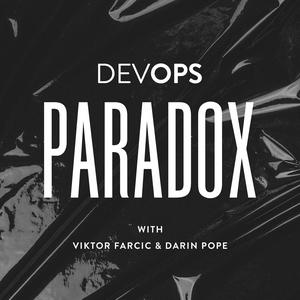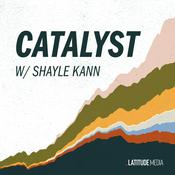336 episodes

DOP 332: 2026 - The Year of Discovery
07/1/2026 | 48 mins.
#332: AI adoption in enterprise software development is accelerating, but operations teams are lagging behind. While application developers embrace AI tools at a rapid pace, those on the ops side remain skeptical—citing concerns about determinism, control, and a general resistance to change. This mirrors previous technology waves like containers, cloud, and Kubernetes, where certain groups initially pushed back before eventually adapting. The prediction for 2026: AI will not see widespread adoption in operations despite its growing presence elsewhere in the software lifecycle. The bigger challenge facing organizations is not just adopting AI but transforming entire processes to take advantage of it. Improving just one piece of the software delivery pipeline—like development speed—only creates bottlenecks elsewhere. Companies cannot hand developers AI tools while keeping everything else the same and expect transformational results. The future points toward a world where experts bring their own AI agents to companies: personal toolsets trained on their experience and best practices that integrate with organizational systems. Perhaps the most provocative insight centers on the value of writing code itself. The argument: writing code is the easiest and least valuable part of software development. The real cognitive load comes from thinking through requirements, architecture, and design. Developers who simply translate instructions to code without deeper engagement may find themselves in real danger as AI continues to advance. Darin and Viktor explore these predictions and more as they look ahead to what 2026 might bring for DevOps, platform engineering, and the evolving role of developers. YouTube channel: https://youtube.com/devopsparadox Review the podcast on Apple Podcasts: https://www.devopsparadox.com/review-podcast/ Slack: https://www.devopsparadox.com/slack/ Connect with us at: https://www.devopsparadox.com/contact/

DOP 331: Looking Back on Our 2025 Predictions
31/12/2025 | 21 mins.
#331: At the end of 2024, predictions were made about what 2025 would bring to the tech industry. A year later, on New Year's Eve, it's time to look back and see what actually happened. The prediction episode from January 1st covered four major topics: rug pulls from companies switching to business source licenses, the rise of WebAssembly adoption, a wave of company acquisitions, and AI becoming embedded in existing tools. Some predictions hit the mark while others missed entirely, but what emerged was something nobody fully anticipated. YouTube channel: https://youtube.com/devopsparadox Review the podcast on Apple Podcasts: https://www.devopsparadox.com/review-podcast/ Slack: https://www.devopsparadox.com/slack/ Connect with us at: https://www.devopsparadox.com/contact/

DOP 330: Merry Christmas (You Should Probably Be Doing Something Else)
24/12/2025 | 1 mins.
#330: In this short episode, Darin and Viktor reflect on the holiday season. YouTube channel: https://youtube.com/devopsparadox Review the podcast on Apple Podcasts: https://www.devopsparadox.com/review-podcast/ Slack: https://www.devopsparadox.com/slack/ Connect with us at: https://www.devopsparadox.com/contact/

DOP 329: Vibe Coding and The Technical Debt Time Bomb
17/12/2025 | 33 mins.
#329: Vibe coding - the practice of casually prompting AI to generate code solutions - has become increasingly popular, but its limitations become apparent when applications need to scale beyond personal use. While AI-assisted development can be powerful for proof of concepts and small internal tools, the transition from vibe-coded solutions to production-ready applications often requires experienced engineers to rebuild from scratch. The conversation explores three distinct levels of software development: personal tooling, internal applications, and public-facing systems. Each level demands different approaches, with vibe coding being most suitable for the first category but potentially problematic as complexity increases. The analogy of cooking illustrates this well - anyone can make a simple meal, but feeding hundreds of people requires professional expertise and proper infrastructure. Technical debt in the AI era presents new challenges and opportunities. Traditional software engineering principles like DRY (Don't Repeat Yourself) and clean code practices may matter less when AI can quickly refactor and improve code. The future likely involves hybrid teams where business experts work alongside experienced engineers, with AI agents handling implementation details. Darin and Viktor examine how pair programming is evolving from developer-to-developer collaboration to human-to-AI partnerships, fundamentally changing how software gets built and maintained. YouTube channel: https://youtube.com/devopsparadox Review the podcast on Apple Podcasts: https://www.devopsparadox.com/review-podcast/ Slack: https://www.devopsparadox.com/slack/ Connect with us at: https://www.devopsparadox.com/contact/

DOP 328: The Real Cost of Build Versus Buy Decisions
10/12/2025 | 36 mins.
#328: The build versus buy decision isn't as binary as most companies think. Every technology choice involves elements of both - you might use Linux (buy) but still configure and customize it extensively (build). The real question isn't whether to build or buy, but finding the right balance between the two approaches based on your company's resources, size, and unique requirements. Companies often fall into the trap of thinking their processes are so unique that existing solutions won't work, leading to unnecessary custom development. This "not invented here" syndrome is particularly common in large enterprises that mistake their size for complexity. In reality, most businesses face challenges that have already been solved by others. The key is recognizing when you truly need a custom solution versus when you can adapt existing tools. The decision becomes more nuanced when considering factors like maintenance costs, compliance requirements, and long-term sustainability. Building internally requires ongoing resources for updates, security patches, and knowledge retention within your team. Meanwhile, buying from vendors shifts much of this burden but introduces dependencies and integration challenges. The conversation features insights from Alex Gusev from Uploadcare, along with perspectives from hosts Darin and Viktor on navigating these complex technology decisions. Alex's contact information: X: https://x.com/alxgsv LinkedIn: https://www.linkedin.com/in/alxgsv/ YouTube channel: https://youtube.com/devopsparadox Review the podcast on Apple Podcasts: https://www.devopsparadox.com/review-podcast/ Slack: https://www.devopsparadox.com/slack/ Connect with us at: https://www.devopsparadox.com/contact/
More Technology podcasts
Trending Technology podcasts
About DevOps Paradox
Listen to DevOps Paradox, Ruined By The Internet? and many other podcasts from around the world with the radio.net app

Get the free radio.net app
- Stations and podcasts to bookmark
- Stream via Wi-Fi or Bluetooth
- Supports Carplay & Android Auto
- Many other app features
Get the free radio.net app
- Stations and podcasts to bookmark
- Stream via Wi-Fi or Bluetooth
- Supports Carplay & Android Auto
- Many other app features


DevOps Paradox
download the app,
start listening.



































